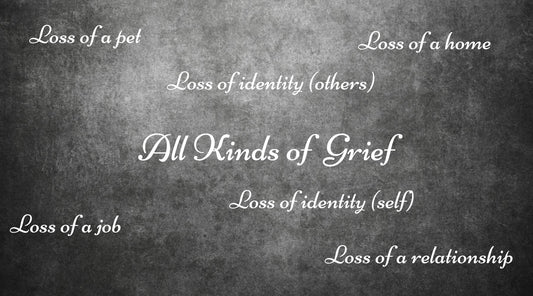And how you can avoid them.
During my time in corporate, I have dealt with 8 coworkers deaths.
Beyond dealing with my own grief for my coworkers, I have emotionally supported and comforted hundreds of people dealing with death in the workplace. No matter my job title, no matter if I know the person personally or not. People come to me with their grief.
Because of my experience I have heard similar mistakes, questions, and topics raised, over and over again.
They tend to fall into distinctive categories.
🌷 Personal
💻 Work Related
🪦 Honoring the Deceased

Personal
What happened? How did they die?
Expect this question because it is always asked. Provide as much information as you can. If you don't know, say that. If you do and have been asked to withhold, say something like, the manner of death hasn't been made public, yet.
When is the funeral?
This question drives me crazy. I have called people to tell them of someone’s passing and immediately I have gotten “when’s the funeral?” And I am like hang on, they just died, like an hour ago. Give the family some space and time.
The best way to handle this question is to answer it before it's even asked. Acknowledge you know this is a question most people want to ask. Let them know, you don’t have the details yet and you will keep them updated as the details become available.
And speaking of funerals
Let’s talk about when funerals or celebrations of life. This is an important topic your staff will bring up. (This might come up if there is an online funeral too, hint: the same advice applies.)
If there are any local staff members to the deceased, the question that will come up is:
Can everyone attend the funeral, especially if it is during work hours?
Please, please really think about this one. I know there is a tendency to want to say and do, “While some of you can go, but we need some people to stay behind and keep the business going.”
I personally have seen the devastation this can cause to staff members. This is one of those things where well intentioned or not, putting the work before people has lasting effects on them.
Funerals and celebrations of life are about getting a chance to say good-bye. You don’t get to decide how people are affected by this death. Someone who didn’t work closely or doesn’t seem to know the person who passed, might be grieving as well. Denying them a chance to say good-bye and to grieve with their other coworkers is cruel.
You don’t know how people are affected by this death. There might be someone in a different department who talked to them over coffee. Or they might have enjoyed saying, “Hi” to them.
In witnessing, the aftermath of the decision to deny someone to go the funeral, I believe this is the worst mistake a leader can make during this time.
People have told me years after the fact, they weren’t allowed to go to the funeral. Sometimes they tell me multiple times to make sure I have heard the impact of a long ago decision. They are still grieving the lost opportunity to have closure and to say goodbye.
Being a leader means balancing business needs versus human needs.
My advice to you, is to let anyone who wants to attend the funeral, attend.
Now, I don’t want to discount the business needs, but let’s look at them objectively.
What is the worst thing that can happen if there is no one at your office for a few hours? Is there a true emergency which would HAVE to be dealt with immediately? Or is the potential “emergency” something that could be handled after the funeral? Take the time to examine what an emergency would be for your company. Again, remember this isn’t being gone for weeks or even days. It is about being unavailable for a few hours.
If you have a large staff in multiple states, could you ask someone else to cover for them? It could be as simple as putting someone’s contact information on everyone’s out of office email.
Depending on your business, could you send an email or post something on your website about being unavailable for a few hours?
If it’s not possible to be unavailable for a few hours, make sure your staff has a way to say goodbye. Check out the “Honoring the Deceased” section in this post. That section needs to be given even more importance, then.
Don’t make them use sick or PTO time to attend the funeral
If they’re salaried employees, attending a funeral shouldn’t be a big deal. Most salary employees work well beyond a 40 hour week already.
If they’re hourly employees, depending on your company’s policies, if you can pay them, pay them. Or let them make up the hours sometime during the week.
This isn’t normal operating times, this is a unique situation.
Showing a bit of kindness and compassion during this time goes a long way with your employees

Work Related
You may or may not hear these questions, but either way they are being thought of and spoken about.
How does this death affect my job?
Now, this might be a tough one to answer.
The answer will also be different depending on each person you supervise. As soon as you have a plan in place to handle the workload of the deceased share it with your staff.
Alternatively, brainstorm with your staff how to split the responsibilities up temporarily. If you already collaborate with your team, this would be the best option.
Either way, if you involve your staff, this will be more productive for the long term.
Which leads me to…
An employee might be thinking: “I would like to take over a responsibility from the deceased, but how do I ask for it without sounding insensitive to their death?”
By talking and collaborating with your team on splitting up responsibilities this question doesn’t have to exist in the void.
Conversely…
An employee might be thinking: “I am so overwhelmed already, how can I possibly take on more work?”
I know when someone dies, especially suddenly, you as the leader have to temporarily shift all the work to others. The faster you can decide if you are going to hire for their position again or redistribute their work is something your staff is craving to know.
Whatever the decision is letting your staff know as soon as possible helps ease the fear of the unknown. When there is fear of the unknown, people are more stressed and less productive.
If you don’t have the option of adding a staff member to help distribute the work, what are some other things you can do to help balance your staff’s workload? These first few months are a good time to reevaluate what everyone is doing.
Is something you could automate a bit more. Could you realign priorities. Maybe a task isn’t needed anymore. Could you hire temporary help or an intern or someone part time instead of full time.
Even just letting your staff know you are trying to come with solutions can go a long way with helping morale.
Asking an employee to take on a deceased person’s responsibilities can be hard
When you ask people to cover their coworkers responsibilities, be sensitive to the fact, they don’t exactly know what their coworker did 100% of the time. Even if they worked closely with them.
Acknowledge this awkward learning curve. Check in with them regularly to see how they are doing and where they are getting stuck. Don’t pretend this is only a week or two disruption. It’s not, it is going to take months to fully understand all of the nuances this person did.
Also, this is different on an emotional level too. When someone quits or retires, there are similar nuances that also come up, but people feel differently about them. There is this unconscious knowing the person is still alive. But when there is a death, this subtly changes the way people react to items when they uncover how the deceased person did something. I have personally experienced this and talked to others who have felt the same way.
As leader the best thing you can do is be supportive of your staff. Immediately after the death and for the weeks and months that follow. Even if it is just a simple email telling the person they are doing a good job. Or if you hear from other employees how the staff person is doing, pass along that encouragement.
I did have a manager tell me how much their staff appreciated what I was doing as I tried to fill in for the short term. And it made such a difference to me to know people realized I was trying my best.
Hiring a New person
If you bring a new person in, tell them the truth. It’s the most awkward experience to come in after a death and not be told about it.

Honoring the Deceased
Employees might go to the funeral, they might privately grieve, but they also want some sort of way to honor the person at work.
This is another big complaint among people. Businesses or bosses didn’t do anything or didn’t do enough to acknowledge the deceased person.
Sending flowers to the funeral from the business is nice, but it’s not enough.
One thing which often happens is coworkers band together and do something to honor the deceased. It rarely comes from management. And when this happens, staff typically still feels resentful that the leaders didn’t do anything or enough in the employees eyes.
As a leader, take the initiative to dedicate part of a staff meeting to brainstorm ways you as a team can honor the deceased.
Maybe it’s a donation in their name to a favorite organization they liked. (Just be careful to make sure no one feels obligated to contribute.)
Maybe you have a lunch honoring them.
Maybe you dedicate something to them. Where people can see it. Maybe it was a project they worked on.
Here is one of my favorite examples of honoring a deceased person. There is a wire tree dedicated to one of my past coworkers. Every year “her” tree is placed in the break room with requests for needed items for a shelter. What I love about this is it honors her and allows people to remember her each year.
Be creative with this. Bring suggestions to your staff meeting to get started and then see where the team wants to go. Maybe they want to do one or more things, there is no right way to do this.
But not doing anything, is remembered for a long time.
My sincerest wish for you, is I hope you will never have to deal with this type of grief.
But if you do, know I am sending you, all of the emotional support, compassion and comfort, I can.
***Blog originally published on Medium under Tara Wilken; Updated here Sept 23***




